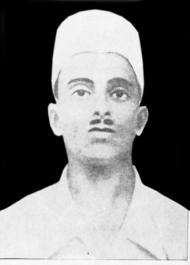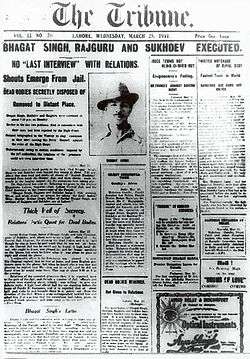Sukhdev Thapar
| Sukhdev Thapar | |
|---|---|
 | |
| Born |
15 May 1907 Ludhiana, Punjab, British India |
| Died |
23 March 1931 (aged 23) Lahore, British India (now in Punjab, Pakistan) |
| Nationality | Indian |
| Organization | HSRA, Naujawan Bharat Sabha |
| Movement | Indian Independence movement |
Sukhdev Thapar (15 May 1907 – 23 March 1931) was an Indian revolutionary. He was a senior member of Hindustan Socialist Republican Association. He was hanged on 23 March 1931 at the age of 23. His ancestral house is in Naughara Mohalla of Ludhiana town, Punjab, India. He was son of Ram Lal and Ralli Devi.[1]
Early life
Sukhdev Thapar, born in Ludhiana, Punjab, British India to Ramlal Thapar and Ralli Devi in a Khatri family. Sukhdev's father died and he was brought up by his uncle Lala Achintram.[2]
Revolutionary activities
HSRA
Sukhdev Thapar was a member of the Hindustan Socialist Republican Association (HSRA), and organised revolutionary cells in Punjab and other areas of North India.[3] He was the chief of Punjab unit of HSRA and instrumental in taking decisions.
Sukhdev is best remembered for his involvement in the Lahore Conspiracy Case of 18 December 1928 and its aftermath.[3] He was an accomplice of Bhagat Singh, and Shivaram Rajguru, whose conspiracy led to the assassination of Deputy Superintendent of Police, J. P. Saunders in 1928 in response to the violent death of the veteran leader Lala Lajpat Rai.[3]
Lahore Conspiracy Case 1930
Sukhdev participated in numerous revolutionary activities such as the 'Prison hunger strike' in 1929; he is best known for his assaults in the Lahore Conspiracy Case (18 December 1928).[4] Sukhdev was the prime accused in the Lahore Conspiracy Case of 1930, whose title reads "Crown versus Sukhdev and others". The first information report (FIR) of the Lahore Conspiracy Case, filed by Hamilton Harding, senior superintendent of police, in the court of R.S. Pandit, special magistrate in April 1929, mentions Sukhdev as accused number 1. It describes him as Swami alias villager, son of Ram Lal, caste Thapar Khatri. In a list of 25 accused, Bhagat is on the 12th position, while Rajguru is on the 20th position. It’s Sukhdev who leads the pack.[1] Bhagat Singh and Shivaram Rajguru, who had been concerned in the assassination of Deputy Superintendent of Police, J.P. Saunders in 1928, consequently avenging the death of a veteran leader, Lala Lajpat Rai, owing to immoderate police beating within the Conspiracy case. After the Central Assembly Hall bombings in New Delhi (8 April 1929), Sukhdev and his accomplices were arrested and convicted of their crime, going through the loss of life sentence as the verdict.
Execution

On 23rd March 1931, the 3 revolutionaries, Bhagat Singh, Sukhdev Thapar and Shivaram Rajguru hanged in Lahore jail.[3][4] Their bodies were secretly cremated at the banks of the River Sutlej.
Reactions to the executions
The executions were reported widely by the press, especially as they took place on the eve of the annual convention of the Congress party at Karachi.[5] The New York Times reported:
A reign of terror in the city of Cawnpore in the United Provinces and an attack on Mahatma Gandhi by a youth outside Karachi were among the answers of the Indian extremists today to the hanging of Bhagat Singh and two fellow-assassins.[6]
Legacy and memorials

National Martyrs Memorial
National Martyrs Memorial is located at Hussainiwala, where Sukhdev, along with Bhagat Singh and Rajguru was cremated. Every year on 23rd March martyrs day (Shaheed diwas) is observed remembering three revolutionaries. Tributes and homage is paid at the memorial.[7]
College
Shaheed Sukhdev College of Business Studies, a constituent college of the University of Delhi, is named in memory of martyr Sukhdev Thapar. It was established in August 1987.[8]
Bus Terminal
Amar Shaheed Sukhdev Thapar Inter-State Bus Terminal is the main bus stand of Ludhiana city, the birth place of Sukhdev.[9]
See also
References
- 1 2 "Mark of a martyr - Sukhdev Thapar". The Tribune India. 13 May 2007. Archived from the original on 23 March 2012. Retrieved 26 May 2018.
- ↑ Pramod Maruti Mande (2005). Sacred offerings into the flames of freedom. Vande Mataram Foundation. p. 251. ISBN 978-81-902774-0-2.
- 1 2 3 4 "Facts about martyr Sukhdev Thapar". India Today. 15 May 2017. Retrieved 25 May 2018.
- 1 2 "Remembering the men who shook up the British Raj". The Economic Times. 23 Mar 2017. Retrieved 25 May 2018.
- ↑ "Bhagat "Indian executions stun the Congress". The New York Times. 25 March 1931. Retrieved 2011-10-11.
- ↑ "Bhagat "50 die in India riot; Gandhi assaulted as party gathers". The New York Times. 26 March 1931. Retrieved 2011-10-11.
- ↑ "Nation paid tributes to Bhagat Singh, Rajguru & Sukhdev on their 86th martyrdom day". Retrieved 25 May 2018.
- ↑ "Shaheed Sukhdev". Shaheed Sukhdev College of Business Studies. Retrieved 25 May 2018.
- ↑ "Punjab Roadways takes city bus stand's charge temporarily". Hindustan Times. 24 Jan 2016. Retrieved 25 May 2018.
Further reading
- Hundal, Sandeep Singh (2013). Sukhdev: An Immortal Martyr of India. Delhi: Indraprastha Prakashan. OCLC 904267904.
- Noorani, Abdul Gafoor Abdul Majeed (2001) [1996]. The Trial of Bhagat Singh: Politics of Justice. Oxford University Press. ISBN 0195796675.
| Wikimedia Commons has media related to Sukhdev Thapar. |